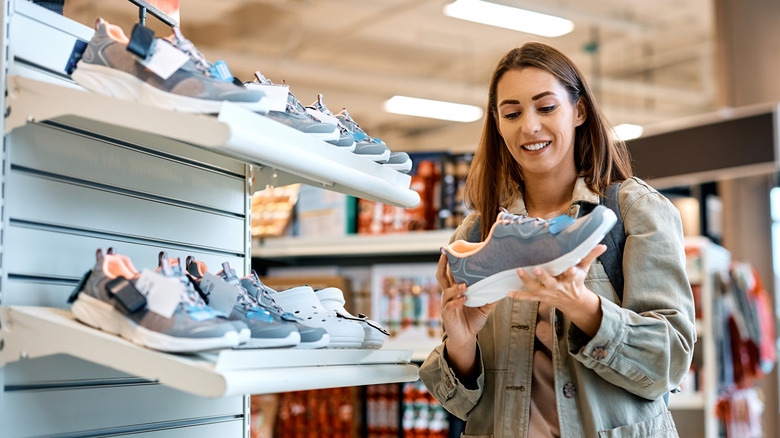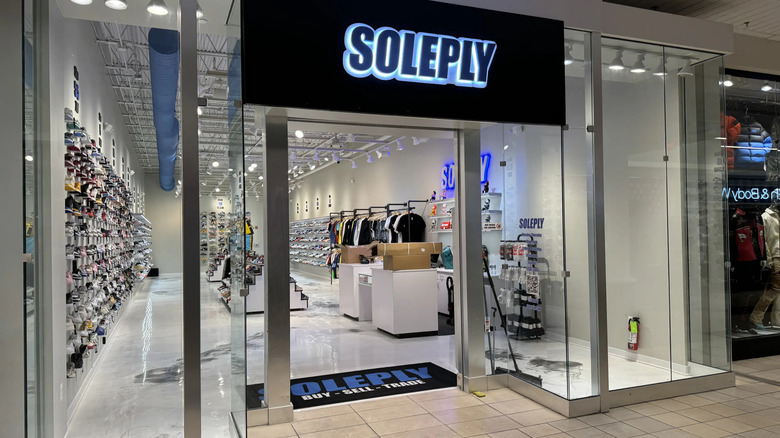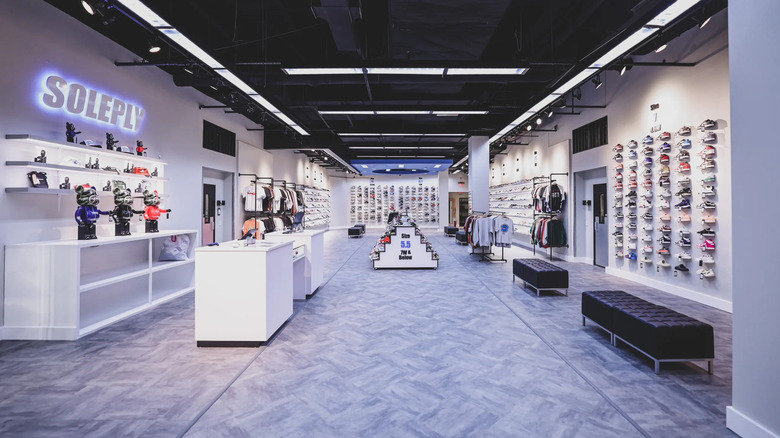The Lesser-Known Shoe Retail Chain That Just Filed For Bankruptcy
In early-2021, entrepreneurs Dustin Billow and Thomas Yoder started a company they dubbed "The Future of Retail." Both Billow and Yoder are confirmed sneaker aficionados — or "sneakerheads," if you prefer — and started a sneaker resale business while still attending high school. From there, it was a short hop to opening an online store, and finally, a series of four brick and mortar retail locations in the northeastern United States. With that, Soleply had officially entered the chat.
Soleply primarily sells designer sneakers from brands like Jordan, Nike, and Kanye West's Yeezy brand, but also stocks more pedestrian offerings like Asics and New Balance. Besides sneakers, the brand also sells a selection of vintage street wear, like t-shirts and hoodies. Though small, the chain has a loyal following, including over 61,000 followers on its Instagram page. Reportedly, shoppers were also willing to travel from other states just to shop at the sneaker emporium.
However, on March 21, 2025, the up-and-coming retailer filed for Chapter 11 bankruptcy protection in New Jersey. As a result, four of Soleply's locations are imminently closing if not already closed. Furthermore, the retailer is attempting to exit leases at two un-opened locations as well as a fifth store location, making Soleply's Cherry Hill, New Jersey store the brand's sole survivor (pun intended).
Physical stores are on the ropes
In Soleply's filing, the brand claimed that the landlords of the already-shuttered Soleply stores were none too pleased with the brand's decision to prematurely end its leases. In fact, several of these landlords had previously threatened legal action in order to recover income from unpaid rent and even penalties for breach of contract. According to bankruptcy documents, Soleply has up to $10 million in debt, though the exact amount is unknown. The number of creditors is similarly vague, with a range between one and 49.
Though its situation is sad, Soleply is hardly alone among beloved retailers that have sought out bankruptcy protection. Recently, shoppers have witnessed Big Lots, JC Penny, Neiman Marcus, and many others fall on financially difficult times. Even among chains which are relatively healthy, stores and once-hot restaurants like Red Robin are being closed en masse in an effort to save money. According to Business Insider, more than 2,500 retail locations are closing or have already closed in 2025. Even more shocking, the total number of store closures nationwide could reach 45,000 by 2029, according to UBS analysts. That said, very large companies like Costco, Home Depot, and Walmart appear to be thriving while their smaller competitors fall by the wayside.
Soleply hopes to rebuild stronger
As far as footwear-specific retailers, Soleply's major competitor, Foot Locker, previously announced that it was closing 400 underperforming stores by 2026 — all contained within shopping malls. However, Foot Locker also hatched a comeback plan, cheekily named "Lace Up," which involves opening 280 new standalone stores to replace its previous mall-centric locations. Whether this strategy ultimately saves the declining company remains to be seen.
On a more regional level, Shoe City, which operated 39 stores in the mid-Atlantic region of the U.S., filed for bankruptcy in 2023 and shuttered all of its locations. The Shoe-pocalypse isn't limited to retailers, either. Whether due to shrinking sales channels, price inflation, or a softening economy, shoe manufacturers are feeling the pinch, too. Notably, comfort-oriented brand Rockport declared bankruptcy in June 2023 and was subsequently purchased by the Authentic Brands conglomerate.
All of this doesn't exactly bode well for Soleply, which hopes to continue operating, if more smartly, post-bankruptcy. Per the brand's bankruptcy filing, "Soleply seeks to discharge unmanageable lease obligations, restructure high-interest debts into more sustainable repayment terms, and emerge as a leaner, financially stable business capable of long-term success in the competitive sneaker market." Considering the lost revenue from its newly-closed stores, that goal could be a tall order to fill.


